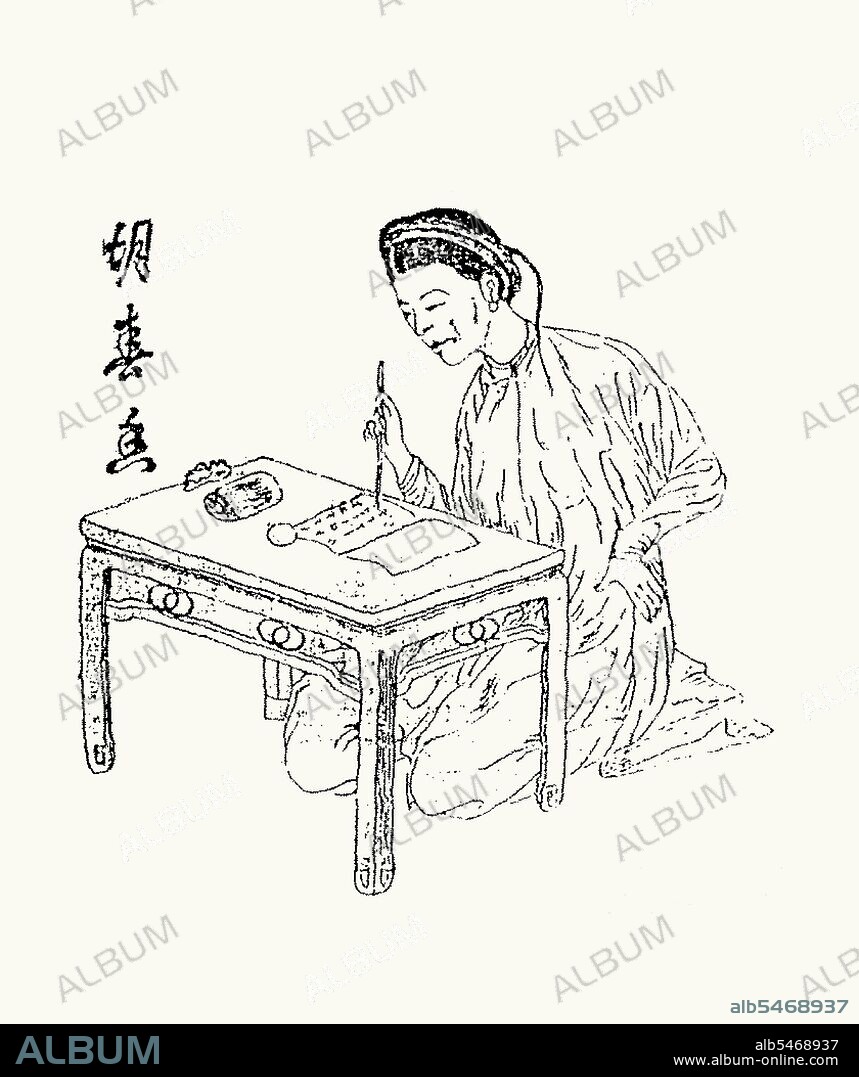alb5468937
Vietnam: Ho Xuan Huong (1772-1822), Le Dynasty poetess and proto feminist, exponent of Chu Nom script in place of traditional Chinese characters and 'outstanding Vietnamese woman' (Th? gi? i Publishers)

|
Zu einem anderen Lightbox hinzufügen |
|
Zu einem anderen Lightbox hinzufügen |



Haben Sie bereits ein Konto? Anmelden
Sie haben kein Konto? Registrieren
Dieses Bild kaufen.
Nutzung auswählen:

Titel:
Vietnam: Ho Xuan Huong (1772-1822), Le Dynasty poetess and proto feminist, exponent of Chu Nom script in place of traditional Chinese characters and 'outstanding Vietnamese woman' (Th? gi? i Publishers)
Untertitel:
Siehe automatische Übersetzung
H? Xuân Huong (1772–1822) was a Vietnamese poet born at the end of the Lê Dynasty. She grew up in an era of political and social turmoil - the time of the Tây Son Rebellion and a three-decade civil war that led to Nguy?n Ánh seizing power as Emperor Gia Long and founding the Nguyen Dynasty. Rather than using Ch? Hán or Chinese characters, Ho Xuan Hong wrote poetry using Ch? Nôm (Southern Script), which adapts Chinese characters for writing demotic Vietnamese. She is considered one of Vietnam's great classical poets and has been called 'The Queen of Nôm poetry'. She became famous and obtained a reputation for creating poems that were subtle and witty. She is believed to have married twice as her poems refer to two different husbands: Vinh Tuong (a local official) and Tong Coc (a slightly higher level official). She was the second-rank wife of Tong Coc, in Western terms, a concubine, a role that she was clearly not happy with ('like the maid/but without the pay'). However, her second marriage did not last long as Tong Coc died just six months after the wedding. She lived the remainder of her life in a small house near the West Lake in Hanoi. She had visitors, often fellow poets, including two specifically named men: Scholar Ton Phong Thi and a man only identified as 'The Imperial Tutor of the Nguy?n Family. ' She was able to make a living as a teacher and evidently was able to travel since she composed poems about several places in Northern Vietnam. A single woman in a Confucian society, her works show her to be independent-minded and resistant to societal norms, especially through her socio-political commentaries and her use of frank sexual humor and expressions. Her poems are usually irreverent, full of double entendres, and erudite.
.
.
Bildnachweis:
Album / Pictures From History/Universal Images Group
Freigaben (Releases):
Bildgröße:
3800 x 4529 px | 49.2 MB
Druckgröße:
32.2 x 38.3 cm | 12.7 x 15.1 in (300 dpi)
Schlüsselwörter:
ASIEN • ASIEN, KONTINENT • DICHTER • DICHTERIN • FEMINISMUS • FEMINISTIN • FRAU • FRAUEN • FRAUENRECHTLERIN • GESCHICHTE • KONTINENT, ASIEN • KUENSTLER • KUNST • KÜNSTLER • LITERATUR • SCHRIFTSTELLER • VIETNAM • WEIBCHEN • WOMAN • ZEITGESCHICHTE
 Pinterest
Pinterest Twitter
Twitter Facebook
Facebook Link kopieren
Link kopieren Email
Email
